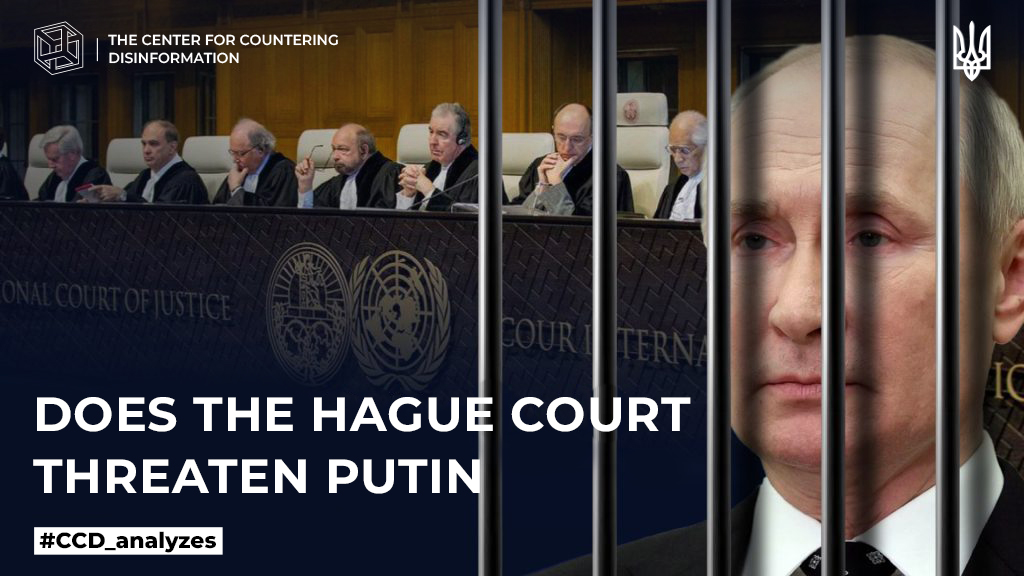The absolute sensation of this week was the decision of the Pre-Trial Chamber of the International Criminal Court (ICC) in The Hague to issue international arrest warrants for the russian president vladimir putin and the commissioner for children’s rights m.lvova-belova. The reason for this decision was the proven forced deportation of 16,226 children from the Donetsk, Luhansk, Kharkiv and Kherson regions to the russian federation.
☝️ The ICC has been in existence since July 2002, its competence includes the prosecution of persons responsible for genocide, war crimes and crimes against humanity. putin became the third sitting head of state in history for whom the ICC issues an arrest warrant (the previous ones were Libyan leader M. Gaddafi and Sudanese leader Omar al-Bashir).
The reaction of the world society and russia to this decision became stormy.
US President J. Biden considers the court’s decision “justified” and notes that putin “clearly committed war crimes.”
The spokesman of the russian president, d.peskov: “…any such decisions are legally null and void for the russian federation.”
Secretary of the National Security and Defense Council of Ukraine O. Danilov: “China will be in a difficult situation after the Hague court’s decision.”
Minister of Justice of Germany M. Buschmann supported the decision of the International Criminal Court, stressing the need for more progress on the way to creating a special tribunal.
Instead, Serbian President Vučić noted: “The ICC warrant for putin’s arrest is a step towards the biggest conflict in human history.”
What are the legal consequences of such a decision for putin, Ukraine and the world?
Firstly, the official status of a suspect in the commission of an international crime will make it difficult for putin to move around the world. Now he will not be able to travel to countries that have ratified the Rome Statute and that recognize the court’s jurisdiction. Among the 123 such countries of Latin America, Africa, and the EU, there are also friendly and neutral countries for the russian federation, such as Venezuela, Mexico, Brazil, the Republic of South Africa (moscow’s BRICS partner), as well as Tajikistan, Kazakhstan, Afghanistan, and Nigeria. If putin visits one of these countries, the local authorities must arrest him. In addition, putin can refer to the court 15 other countries that have not ratified the Rome Statute yet, but must respect the arrest warrant.
Secondly, the ICC’s decision will be a certain signal for putin’s entourage among the russian oligarchs who are trying to circumvent sanctions and leave at least some wealth outside the russian federation. The understanding that a personal accusation by international justice will allow putin’s entourage to “rewrite” all the crimes on him and ease the sanctions pressure on their business abroad, removes from the oligarchs the motivation to further support the putin regime, thereby destroying it from the inside.
For the russian opposition, the decision of the International Criminal Court gives a reason to consolidate in order to change the political regime in the russian federation.
For the world, the decision of the ICC is evidence that the international community is tired of the dictator’s crimes and a clear signal that putin no longer has immunity and there are legal grounds for his detention.
For the leaders of Western countries, this is a recognition of putin’s toxicity and an argument for the creation of a special international tribunal to investigate his crimes, which should eliminate such a major shortcoming of the International Criminal Court as the lack of in absentia conviction of the highest leadership of the russian federation.
For countries on the US and EU sanctions list, the decision of the ICC is a clear message that continued cooperation with a suspect in the commission of war crimes may lead to the introduction of even stronger sanctions and restrictions. Even leaders who were previously loyal to the kremlin’s policy will think twice about whether they should shake hands with the russian president or sit down with him at the negotiating table.
The ICC’s decision will put such an authoritarian partner of putin as Xi Jinping in a rather uncomfortable position. For the Chinese leader, the expediency of the visit to moscow planned for March 20-22, where one of the topics of discussion will be the establishment of peace in Ukraine, becomes problematic. After all, when he shakes hands with the russian helmsman, in the eyes of the world community he will turn from a “peacemaker” into an accomplice of an international criminal.
Ukraine has a legal basis to demand putin’s arrest on the territory of those countries that recognize the decision of the International Criminal Court. Also, the decision of the International Court of Justice is a practical step in the implementation of the intention to bring russia to criminal responsibility for the most serious crime in the world – the genocide of the Ukrainian people. After all, although the forced deportation of the civilian population (according to the article of the Rome Statute of the ICC) does not directly fall under the crime of genocide, the forcible transfer of Ukrainian children to another group (russian families or orphanages) can be recognized as an act of genocide, which potentially allows the ICC to later reclassify the case.
❗️The ICC indictment opens up a number of new opportunities for condemning the crimes of putin and his supporters. It is obvious that the kremlin will try to undermine the positions of the ICC and launch an active propaganda campaign to discredit this decision, as well as encourage its allies to withdraw from its jurisdiction.










